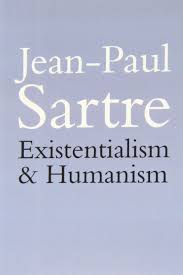
Table of Contents
Buy as E-book, Paperback, or Hard-cover
Freedom as a Burden and a Gift
Originally delivered as a public lecture in 1945, Existentialism is a Humanism offers a lucid, provocative summary of Sartre’s existentialist philosophy. Though not a technical philosophical treatise, this compact work catalyzed widespread understanding—and critique—of existentialism’s claims about freedom, responsibility, and authenticity in the post-war human condition.
Sartre’s central thesis—that existence precedes essence—reverses centuries of essentialist metaphysics. Rather than being defined by a God, nature, or fixed human “essence,” man defines himself through actions in the world. We are condemned to be free, he declares, and with that freedom comes radical responsibility.
Core Themes: Radical Subjectivity and Moral Responsibility
1. Existence Precedes Essence
Unlike a manufactured object whose purpose is defined before creation, humans exist first—and then become through their choices. There is no blueprint for human nature. Sartre strips away all absolutes, demanding that each individual create values through action.
This existentialist reversal of essence and existence is an ethical challenge: we become what we do, and cannot hide behind excuses, authorities, or traditions.
2. Condemned to Be Free
Freedom is not a choice—it is our condition. Even choosing not to choose is itself a choice. Sartre’s existentialism is thus not nihilism, as critics claimed, but a call to moral engagement without divine or universal moral coordinates.
In this framework, each choice affirms a vision of humanity: when I choose, I am also choosing what I believe all people ought to be. Therefore, every act has universal weight.
3. Anguish, Abandonment, and Despair
These existential emotions arise not from weakness, but from clarity:
- Anguish: the awareness that one’s actions shape humanity.
- Abandonment: recognition that there is no divine lawgiver.
- Despair: acceptance that we can only control our own will and actions, not the outcomes.
Far from pessimism, Sartre sees in these emotions the path to authenticity.
Historical Context: Post-War Ethics and Secular Morality
Delivered just after the devastation of WWII, Sartre’s lecture served as both philosophical declaration and moral reorientation. Europe stood amid the ruins of failed ideologies—fascism, Stalinism, blind religiosity. Sartre sought to construct a secular, individualistic ethic, one that avoided both moral relativism and authoritarian dogma.
His brand of atheistic existentialism contended that meaning must be forged through lived, concrete action—not inherited systems. In a world where God is dead and ideologies exhausted, man must become his own creator.
Legacy: Misunderstood Yet Inescapable
Though Sartre’s critics (especially Christians and Marxists) branded existentialism as amoral or nihilistic, his view was profoundly ethical: moral responsibility begins when excuses end. Existentialism is a Humanism ignited decades of debate and made Sartre a household name.
Its influence spread to:
- Postwar literature and cinema (e.g., Camus, de Beauvoir, Bergman)
- Continental philosophy and ethics
- Humanistic psychology and personal development
- Radical politics (autonomy, action, and revolution)
It remains a gateway text for those exploring freedom, identity, and moral choice.
Strengths and Limitations
Strengths:
- Clarity and accessibility of abstract ideas
- Stirring moral urgency and political relevance
- Timely response to cultural and intellectual crisis
Limitations:
- Oversimplification of complex ontological ideas
- Neglects collective structures and social embeddedness
- Later disowned by Sartre himself as overly popularized
Who Should Read It?
- Newcomers to existentialist philosophy
- Thinkers seeking secular, action-based ethics
- Students exploring post-war European thought
- Readers questioning identity, purpose, and moral autonomy
TL;DR
Though Sartre later criticized this lecture as “too glib,” Existentialism is a Humanism remains a brilliant, urgent distillation of a philosophy that insists: you are what you do, and the weight of freedom cannot be shrugged off. In an age saturated with external scripts and algorithmic influences, Sartre’s call to authentic, deliberate existence is more timely than ever.
Leave a Reply